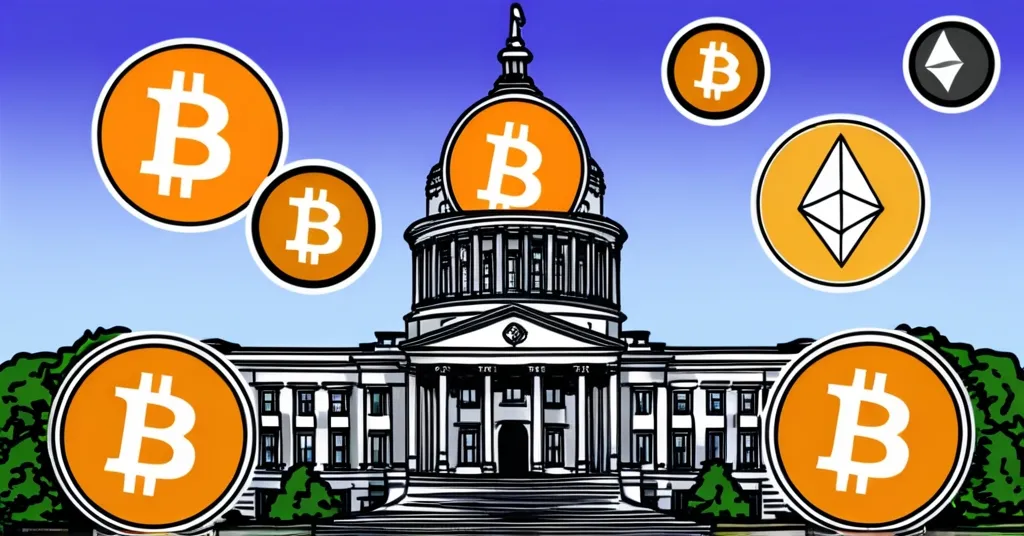North Dakota Proposes Bitcoin Investment to Combat Inflation, Vote Tuesday

North Dakota Explores Bitcoin Adoption with New Legislative Proposal
North Dakota is considering investing state funds in Bitcoin and other digital assets with Resolution 3001, a move aimed at combating inflation. This non-binding proposal, while not a law, signals a growing trend among U.S. states to embrace cryptocurrencies in their financial strategies.
- North Dakota introduces non-binding proposal to invest in Bitcoin and digital assets.
- Proposal backed by key legislators and set for vote on Tuesday.
- New Hampshire introduces similar bill on the same day.
- Reflects growing trend of states considering cryptocurrencies as inflation hedges.
Resolution 3001, introduced by Representatives Nathan Toman, Matthew Heilman, Jared Hendrix, Daniel Johnston, SuAnn Olson, and Todd Porter, alongside Senators Jeff Barta and Bob Paulson, seeks to diversify North Dakota’s financial reserves. Although Bitcoin isn’t explicitly mentioned, the intent is clear: to hedge against inflation and explore new investment opportunities. “The resolution is simply encouraging the State Treasurer and the State Investment Board to look at investing in different types of assets rather than what they currently do,” explains John Bjornson, Director of the North Dakota Legislative Council.
Digital assets, like Bitcoin, can act as an inflation hedge, protecting against the decreasing value of money over time. This move by North Dakota isn’t just chasing digital dreams; they’re looking to hedge their bets with a bit of digital gold. Could North Dakota be the next state to embrace Bitcoin as a hedge against inflation?
This move by North Dakota is not isolated; on the same day, another state took a similar step. New Hampshire introduced a bill aimed at establishing a state Bitcoin reserve. Representative Keith Ammon, a vocal advocate for digital assets, emphasizes the urgency of this move:
“The state that is last to build Bitcoin reserves will lose. It’s urgent that states act sooner than later, and that takes some education on the part of state officials.”
This simultaneous action highlights a broader trend among states like Florida, Texas, Pennsylvania, Ohio, and Louisiana, all exploring or implementing Bitcoin-related financial strategies.
The potential passage of Resolution 3001 in North Dakota could mark a significant step towards mainstream adoption of digital assets in public finance. As states vie to diversify their reserves and hedge against inflation, the role of cryptocurrencies becomes increasingly apparent. However, it’s important to approach this trend with a balanced perspective. While the optimism surrounding Bitcoin’s potential is understandable, the volatility and regulatory uncertainties of digital assets should not be underestimated.
While some see this as a forward-thinking move, others worry about the volatility of digital assets. “State investments in Bitcoin could signal a new era of financial innovation,” says blockchain expert Dr. Jane Doe. “But it’s crucial to consider the risks, including market fluctuations and regulatory challenges.” North Dakota’s move, set for a vote on Tuesday, could inspire other states to follow suit, further solidifying Bitcoin’s role as a cornerstone asset in public financial policy. Yet, as we champion decentralization and the disruption of traditional financial systems, we must also advocate for secure custody solutions and comprehensive education on the risks and rewards of digital asset investments.
As North Dakota and other states like New Hampshire explore Bitcoin investments, the debate continues on the best way to secure financial futures in a digital age. It’s also worth noting that while Bitcoin may lead the charge, altcoins and other blockchain systems like Ethereum also play vital roles. They fill niches that Bitcoin itself might not serve, contributing to a more diverse and resilient financial ecosystem.
Key Questions and Takeaways:
- What is North Dakota’s Resolution 3001 about?
North Dakota’s Resolution 3001 proposes investing state funds in digital assets and precious metals as a hedge against inflation. It is a non-binding proposal encouraging the State Treasurer and Investment Board to explore alternative investment options.
- Why is the resolution advisory and not legally binding?
The resolution is advisory to allow for flexibility and further discussion on the specifics of digital asset investments without immediately committing to legal changes. This approach enables state officials to study and understand the potential impacts before formal legislation.
- What is the significance of New Hampshire’s simultaneous legislation?
New Hampshire’s legislation for a state Bitcoin reserve, introduced on the same day, highlights a broader trend among U.S. states to recognize Bitcoin’s potential as a strategic asset. It underscores the urgency and competition among states to adopt such measures.
- How does this trend reflect on the broader acceptance of cryptocurrencies?
The trend among multiple U.S. states to explore Bitcoin and digital asset investments indicates a growing acceptance of cryptocurrencies as legitimate financial tools. It suggests a shift towards mainstream adoption and recognition of their potential to serve as inflation hedges and strategic assets.
- What could be the implications if North Dakota’s resolution passes?
If North Dakota’s Resolution 3001 passes, it would signal another step towards the mainstream adoption of digital assets by state governments. It could encourage other states to follow suit and further solidify Bitcoin’s role in public financial policy as a potential cornerstone asset.



